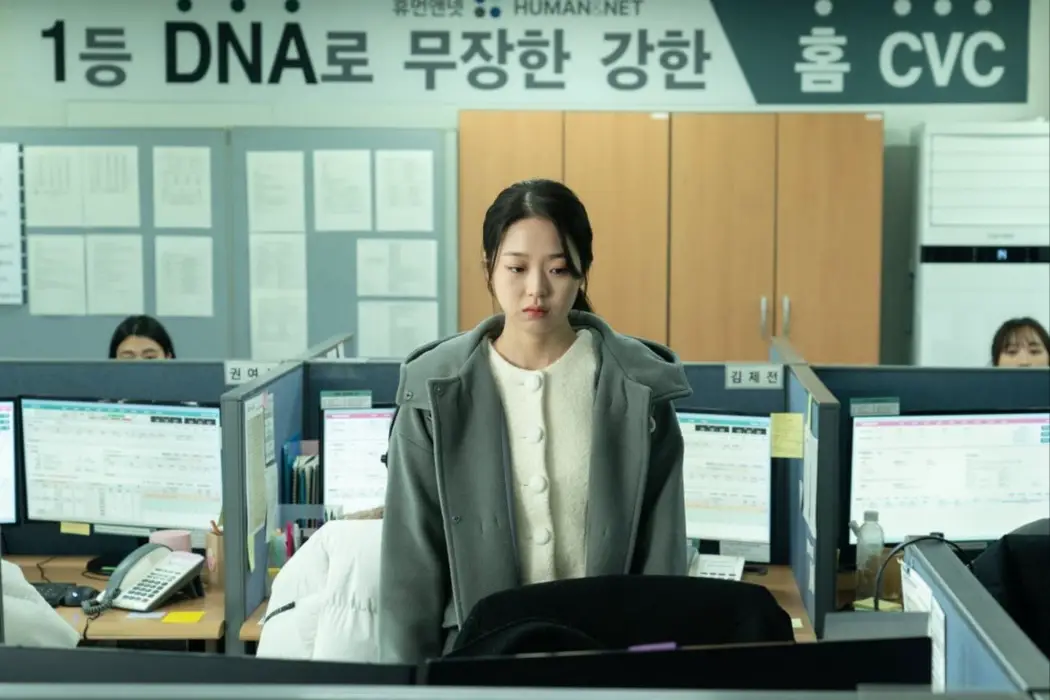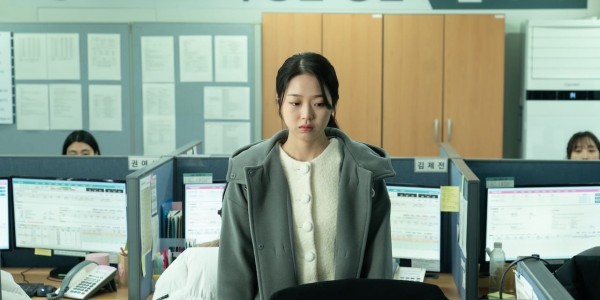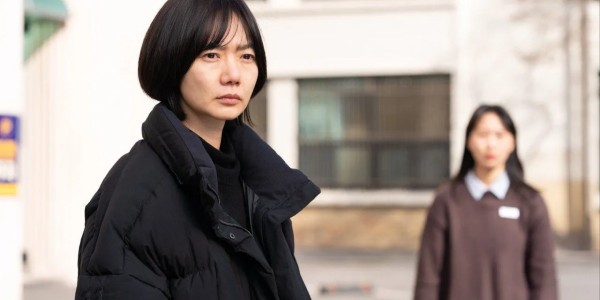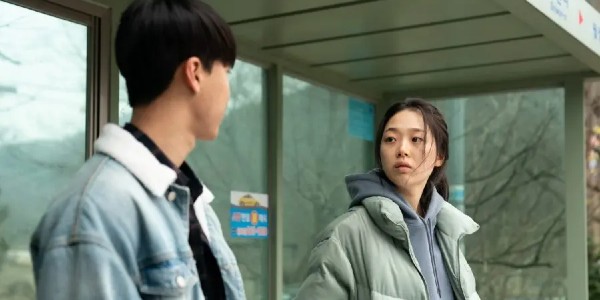London Film Festival 2022: NEXT SOHEE: The High Price Of Work

All I know is that Oscar Isaac would make a…
“Do you even know what I do there?” a teary Sohee asks the teacher who secured her call centre “externship”. She’s just been given a three-day suspension for attacking her manager. “You’re a call center agent. You help customers and give them information!” he responds.
It’s technically the truth, but only a fraction of it. Mostly Sohee is shouted at, insulted and harassed. Those on the end of the line scream at and belittle her, while management exploit her. Caught as much between the dividers that separate the girls’ booths as between the proverbial rock and hard place, Sohee is more than stuck — she’s pinned.
Writer and director Jung Joo-ri’s Next Sohee is an indictment of modern work and exploitation in South Korea, emotionally exploring the high price young Koreans are forced to pay to get paid.
Exploring workplace exploitation
Sohee (Kim Si-eun) is a higher schooler. She’s fiery (threatening to fight a stranger who mocks her livestreaming friend during dinner), funny, has friends and hobbies, and the potential spark of a relationship. In other words, a normal teenager.
Sohee is willing to work hard too — not just inf employment, but in her labours of love. The opening scene shows her dancing. She’s good, but falters on a certain step. Up, she tries again. No matter — she tries again.
And soon, when her home tutor gets her a job at a call center for her ‘externship’, she practices taking calls so she can quickly learn on the job. Her tutor lets her know just how lucky she is to get this job at one of Korea’s most respected telecom agencies.

Shadowing her first call, a caller screams at her colleague. “Bad call,” the manager says. But so is the next, and the next. It continues to go wrong from there. Or actually, it’s going according to plan — to the business’ plan. Mistreatment and exploitation is the name of the game. The business offers financial incentives for good work and working overtime, but then they don’t pay them at the end of the month as an incentive for them to stay with the company. There’s public humiliation if people aren’t pulling their weight, never mind that the weight allocated to them is far too heavy.
Teenagers often want to grow up and get into the real world. If they realised that the real world might be the one Sohee is thrust into, they’d choose the Peter Pan route and never grow up.
The myopia of ‘hard work’
Most films keep their characters’ jobs thrust so far into the background of their lives you’d barely glimpse it with binoculars. TV sitcoms are particular culprits. Next Sohee flips it. Work overwhelms. It pushes its way to the foreground of Sohee’s life so much that her life becomes the speck in the background you need to strain to see, until it disappears completely.
Her dancing falls by the wayside. Friendships, potential relationships and family closeness all disappear, until Sohee ends up numbing the pain like the snow that slowly falls.
A tabloid might name it, ‘The Call Center From Hell’, but they a) couldn’t and b) wouldn’t. Couldn’t because there’s nothing uniquely hellish about this particular call centre and wouldn’t because the public opinion which the tabloid reflects accepts the hellishness of this working culture.
South Koreans call it ‘gwarosa’. It means death by overworking. South Koreans work more than any other OECD country. There’s grind culture and then there’s this. Working overtime and weekends is the norm. To many South Koreans, work-life balance is as foreign a notion as a being airdropped into the middle of village fete in rural Berkshire. People aren’t ‘grinding’; they’re being ground.
Jung Joo-ri’s communicates this culture through dialogue as much as action, littering the filming with the lexicon of the imagined workshy. Those people are ‘slackers’. Others aren’t willing to ‘work hard’. Sohee, her manager tells her, is ‘money grubbing’ (for requesting the payment she earned but wasn’t paid, naturally).
Part drama, part police procedural
When Sohee’s first manager can no longer stomach the exploitation he’s participating in, while he’s being abused by those higher up than him in a bleak Russian doll of exploitation, Sohee struggles to deal with it, holding off on signing off on company cover up while she holds on to her sense of justice.

He’s quickly replaced. “Meet the new boss. Same as the old boss,” sang The Who. But they’re not quite being fooled again. They know what’s going on; they’re just powerless to do anything about it.
The film switches from the drama of Sohee’s life into a police procedural over half way through, as Sohee’s trajectory ends. Bae Doona’s detective who leads the case and the rest of the film, Yu-jin, represents an interesting dynamic in the film’s structure between, in the latter half, the importance of doing your job well and, in the first, the importance of not doing it at all if success means exploitation.
The crime scene over which Yu-jin has authority quickly expands, out to the workplace, to her school, to the dance studio, out and out, until South Korean society is the crime scene – over which her jurisdiction disappears. Like a modern An Inspector Calls, Jung Ju-ri script implies the sphere of responsibility expands to almost everyone. And, unsurprisingly, everyone strains to duck responsibility as though contorting from a quickly lowering limbo stick of blame. It’s not an individual’s fault, but a collective fault — which of course means each individual’s fault.
Strong performances protect from melodrama
Jung Joo-ri soaks everything in grey. She uses music sparingly, creating a stripped-down feel that serves to underline the importance of the moments in which it’s used. Similarly, she opts for unshowy direction in her shot selection, choosing to punctuate the monotony with moments of tightly composed beauty — and deploying them when Sohee and Yu-jin are at their lowest ebb.

In a less deft director’s hands, the second half of the film in particular might’ve descended into a melodramatic mawkishness that eroded the sympathy built up in the first. Action films have kill counts; Next Sohee should have a cry count.
The performances see it through. Where Sohee once stood out from the film’s quiet placidity, Kim Si-eun portrays Sohee melding with the mood, the film’s grey monotony enveloping her like an inevitability. Si-eun keeps us with her like white on rice, retaining an exterior of disinterest, the interior origin of which is the depression that disallows the summoning of an exterior display of interest. She keeps her emotion controlled and leaves the tears to her family and friends.
And if the film’s second half doesn’t have the same sense of momentum (potentially reflecting the slow circularity of the police’s determination to actually solve the crime – but that’s probably generous), Bae Doona’s Yu-jin puts a new spin on the disaffected detective stereotype, as what ends up as a raging dissatisfaction against the authority she represents starts as simple, relatable apathy for work.
Strong performances, solid direction and a viscerally emotional story keep Next Sohee on the right side of melodrama. Though not a typical Friday night movie, watching Next Sohee without having to go back to the work the next day might be a good idea.
From Next Sohee to Office Space, what’s your favourite film about work? Let us know in the comments below!
Watch Next Sohee
Does content like this matter to you?
Become a Member and support film journalism. Unlock access to all of Film Inquiry`s great articles. Join a community of like-minded readers who are passionate about cinema - get access to our private members Network, give back to independent filmmakers, and more.













